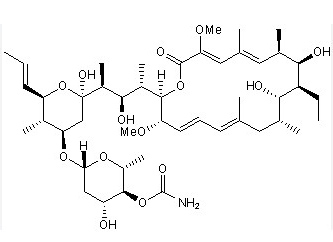HIV News: Scientists Discover Naturally Occurring Antiviral: Concanamycin A, That Can Possibly Cure Not Just Treat HIV!
Nikhil Prasad Fact checked by:Thailand Medical News Team Mar 10, 2024 1 year, 11 months, 1 week, 5 days, 15 hours, 8 minutes ago
HIV News: In a groundbreaking discovery, a team of researchers from the University of Michigan has made significant strides in the fight against HIV, revealing a naturally occurring antiviral compound that holds the potential not only to treat but also to cure the elusive HIV virus. The compound, known as concanamycin A (CMA), was modified in the lab, paving the way for advanced lead compounds with potent anti-HIV activity. This development covered in this
HIV News report, could mark a pivotal shift in the quest for a cure for HIV, challenging the virus's ability to hide within the immune system and providing new hope for those affected.
 Concanamycin-A
Understanding the Challenge
Concanamycin-A
Understanding the Challenge
Despite the availability of effective treatments to manage HIV, a complete cure has remained elusive due to the virus's unique ability to remain dormant within reservoirs of infected cells. Unlike other viruses that are typically cleared by the immune system after infection, HIV persists throughout a patient's lifetime, necessitating lifelong treatment. A key player in this evasion is a protein called Nef, produced by the virus, which shuts down the immune system's alert system, preventing it from recognizing and eliminating the virus.
Discovery of Concanamycin A
For over 15 years, Professor Dr Kathleen Collins and her team at the University of Michigan Medical School have been studying the Nef protein. Their research has focused on understanding how Nef enables HIV to evade the immune system and exploring potential strategies to counteract its effects. In their quest for novel antiviral compounds, they discovered that concanamycin A (CMA), a natural compound produced by a soil-derived microorganism, can inhibit HIV Nef, allowing the immune system to identify and eradicate infected cells.
However, utilizing CMA as a therapeutic faced significant challenges. One of the primary obstacles was the limited supply of the compound. While CMA occurs naturally, the original bacteria that produce it do so in quantities too small for practical use in laboratory testing and modification. Additionally, CMA's primary function in human cells is to inhibit an enzyme called V-ATPase, essential for cellular processes. Blocking V-ATPase could have detrimental effects, making it crucial to modify CMA's activity to target HIV Nef specifically.
Overcoming Challenges
To address these challenges, the research team employed innovative strategies, combining bioengineering and synthetic chemistry to enhance CMA's efficacy as an anti-HIV agent while minimizing off-target effects. Through bioengineering techniques, Professor David Sherman's team was able to develop a bacterial strain capable of increasing CMA production by an impressive 2,000-fold. This breakthrough provided a sustainable supply of the compound for further testing and modification.
Simultaneously, synthetic chemists in the lab synthesized over 70 new variations of CMA, altering chemical groups to explore their potency against HIV Nef while avoiding inter
ference with V-ATPase. These modifications aimed to widen the effective dosage gap, ensuring that CMA could inhibit HIV Nef without adversely affecting essential cellular processes.
Safety and Potency Assessment
The newly developed CMA analogs underwent rigorous testing to evaluate their safety and efficacy. Professor Collins and her team conducted extensive tests to assess the compounds' toxicity to human cells, as well as their impact on HIV Nef and V-ATPase activity. Despite CMA's potent activity against HIV Nef, ensuring minimal side effects was a priority before progressing to animal or human trials.
The research team identified several CMA analogs that exhibited high potency in blocking HIV Nef at low dosages, with minimal off-target effects or cellular toxicity. These promising results provided a strong foundation for further development and optimization of the compounds for clinical use.
Insights from Structure - Activity Relationships Study
The study delved into the mechanism of action of CMA compounds, providing essential insights into their ability to inhibit HIV Nef effectively.
The study assessed 76 compounds for their ability to inhibit Nef, viability of target cells, and lysosomal acidification. Natural concanamycins and their derivatives emerged as the most potent compounds, highlighting the significance of structural modifications in enhancing their anti-HIV activity. By understanding the structure - activity relationships of CMA analogs, researchers gained valuable insights into their mechanism of action and identified advanced lead compounds for further development.
Conclusion
The University of Michigan's groundbreaking research unveils a potential game-changer in the quest to combat HIV. The modified CMA analogs showcase high potency in blocking HIV Nef while addressing challenges related to supply and potential side effects. As researchers continue their meticulous approach to refining these compounds, hope arises for a future where HIV is not just treated but truly cured.
The journey towards a cure for HIV has taken a significant leap forward, offering renewed optimism for millions of individuals living with this persistent virus. While additional research and clinical trials are necessary to validate the efficacy and safety of these compounds, the discovery of naturally occurring antiviral agents like CMA opens new avenues for combating HIV and brings us one step closer to a world free from the burden of this devastating disease.
The research findings were published in the Journal of Medicinal Chemistry under the title "Structure–Activity Relationships of Natural and Semisynthetic Plecomacrolides Suggest Distinct Pathways for HIV-1 Immune Evasion and Vacuolar ATPase-Dependent Lysosomal Acidification."
https://pubs.acs.org/doi/10.1021/acs.jmedchem.3c01574
For the latest
HIV News, keep on logging to Thailand Medical News.
